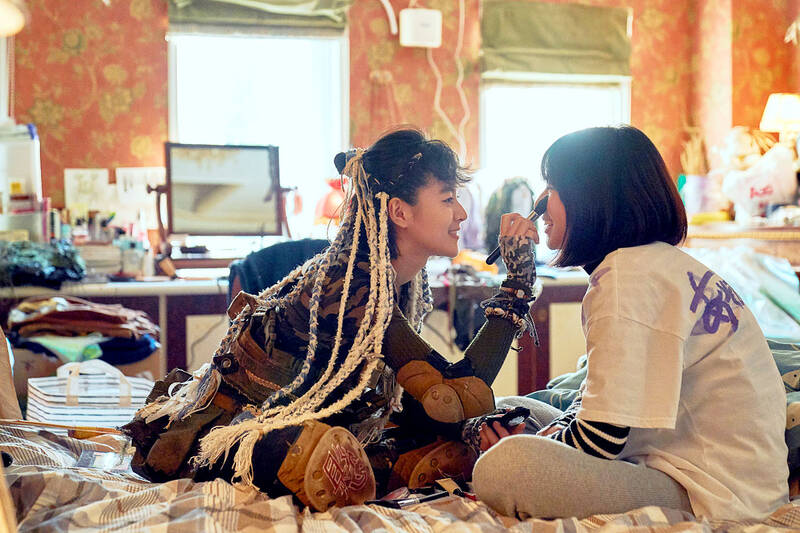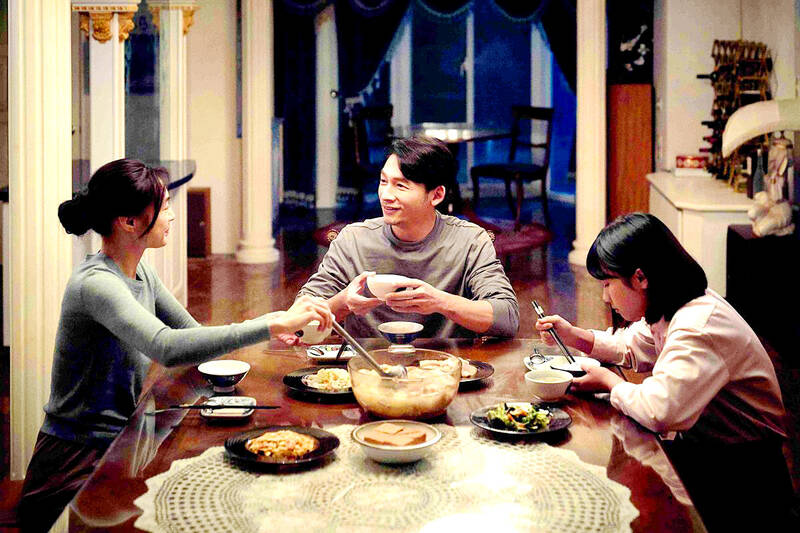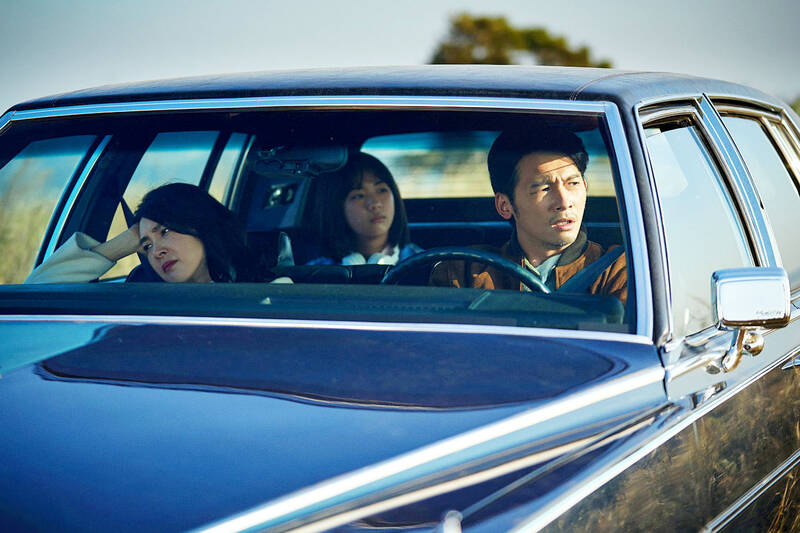Part of this movie is set in Moon Kingdom, a fantastical place hidden in an abandoned amusement park, but the reality 16-year-old Melody (Cheng Hsi-ti, 程希緹) lives in is also quite surreal.
Eschewing linearity, Melody-Go-Round shifts between the two realms and also jumps through time, but the plot is still an easily digestible family drama.
After a bad investment leads the family into bankruptcy, Melody’s father Tai-sheng (James Wen, 溫昇豪) moves the family into his friend’s empty rural mansion. The friend emigrated to the US after marrying an American woman, and the decor of the house is eccentric, almost like a Western castle. Tai-sheng drives around town in the friend’s old car with American flags planted on each side of the hood, eking out a living through odd jobs such as reporting illegal cars, hunting pigeons and selling counterfeit goods. These ventures often get him in trouble.

Photo courtesy of Swallow Wings Films
His marriage to Hui-min (Peggy Tseng, 曾珮瑜), who reluctantly works as a salesperson in a luxury jewelry store, has collapsed, but they’re still determined to fake it until Melody turns 18.
But they aren’t good at it, fighting incessantly and carrying on affairs. Melody is aware of the latter, of course, accidentally seeing her mother have car sex, and her frustration and anger toward her parent’s behavior and shenanigans are the focus of the plot.
The simple premise is made entertaining through the overt surrealism in both worlds. Melody is invited to join the Moon Kingdom after sneaking into the creepy amusement park, which is inhabited by a group of youngsters who wrestle, hunt, make hooting sounds and claim to be totally free.

Photo courtesy of Swallow Wings Films
The real-world bits are more surreal than the fantasy bits. In one scene, Tai-sheng calms a vicious dog by jerking it off while delivering street-caught pigeons to a customer. The bizarre scene ends with Melody grabbing the bag and setting the birds free, while Tai-sheng stares exasperatedly at the sky.
Unsurprisingly, Melody is upset, and Moon Kingdom becomes a more rational vehicle for her to deal with her problems and come to terms with what’s going on. But she needs to first pass a series of challenges to be fully accepted into the rowdy group.
The three leads provide decent acting, but Wen’s vivid portrayal of the caring yet dishonest and often flippant father is especially memorable.

Photo courtesy of Swallow Wings Films
This is director Lai Kuo-an’s (賴國安) second feature after a successful commercial career. His 2017 debut A Fish Out of Water (上岸的魚) also used magical elements to explore a family story, and he seems to be taking this device a step further in Melody-Go-Round.

June 9 to June 15 A photo of two men riding trendy high-wheel Penny-Farthing bicycles past a Qing Dynasty gate aptly captures the essence of Taipei in 1897 — a newly colonized city on the cusp of great change. The Japanese began making significant modifications to the cityscape in 1899, tearing down Qing-era structures, widening boulevards and installing Western-style infrastructure and buildings. The photographer, Minosuke Imamura, only spent a year in Taiwan as a cartographer for the governor-general’s office, but he left behind a treasure trove of 130 images showing life at the onset of Japanese rule, spanning July 1897 to

One of the most important gripes that Taiwanese have about the Democratic Progressive Party (DPP) is that it has failed to deliver concretely on higher wages, housing prices and other bread-and-butter issues. The parallel complaint is that the DPP cares only about glamor issues, such as removing markers of Chinese Nationalist Party (KMT) colonialism by renaming them, or what the KMT codes as “de-Sinification.” Once again, as a critical election looms, the DPP is presenting evidence for that charge. The KMT was quick to jump on the recent proposal of the Ministry of the Interior (MOI) to rename roads that symbolize

On the evening of June 1, Control Yuan Secretary-General Lee Chun-yi (李俊俋) apologized and resigned in disgrace. His crime was instructing his driver to use a Control Yuan vehicle to transport his dog to a pet grooming salon. The Control Yuan is the government branch that investigates, audits and impeaches government officials for, among other things, misuse of government funds, so his misuse of a government vehicle was highly inappropriate. If this story were told to anyone living in the golden era of swaggering gangsters, flashy nouveau riche businessmen, and corrupt “black gold” politics of the 1980s and 1990s, they would have laughed.

Imagine being able to visit a museum and examine up close thousand-year-old pottery, revel alone in jewelry from centuries past, or peer inside a Versace bag. Now London’s V&A has launched a revolutionary new exhibition space, where visitors can choose from some 250,000 objects, order something they want to spend time looking at and have it delivered to a room for a private viewing. Most museums have thousands of precious and historic items hidden away in their stores, which the public never gets to see or enjoy. But the V&A Storehouse, which opened on May 31 in a converted warehouse, has come up